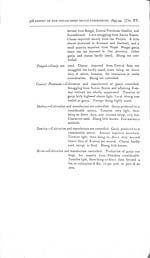Medicine - Drugs > Report of the Indian Hemp Drugs Commission, 1894-1895 > Volume I
(343) Page [309]
Download files
Individual page:
Thumbnail gallery: Grid view | List view
![(343) Page [309] -](https://deriv.nls.uk/dcn17/7443/74435056.17.jpg)
CHAPTER XVI.
PROVINCIAL SYSTEMS EXAMINED.
Scope of this Chapter.
633. In Chapter XIV the
Commission dealt with the general policy which, in
their opinion, should
regulate the excise administra-
tion in respect of hemp drugs, and in Chapter XV
they have described the systems at present existing in British
India. They will
now offer some remarks regarding the measures necessary to give
effect to that
policy, and will then proceed to examine the existing systems in
the light of these
remarks, adding their recommendations where change of any kind
seems desir-
able.
Farm of monopoly of vend
not
sufficient.
634. The simplest method
of dealing with the subject is to farm the mono-
poly of vend, leaving the lessee to make his own
arrangements for a supply of the drugs and their
sale to the public. This is the system (with some slight
differences) which is in
force in the North-Western Provinces, the Punjab, Madras, Bombay,
and the minor
administrations. It has the advantage of relieving the Government
of all responsi-
bility or interest in the matter beyond the disposal of the farms.
It secures
a preventive agency of a non-official kind for dealing with illicit
sale and smug-
gling; and if proper care is taken to appoint respectable vendors
to prevent
combinations for the purpose of keeping down the price of the
farms, and
to license shops only when they are required by the local demand,
such a system
may appear to be successful and sufficient. But there are some
serious objec-
tions to it. In the first place, it has the disadvantage of
exercising no control
over the production and consumption. Large profits do not depend
upon the
price being raised to the pitch necessary to check excess; they are
as easily real-
ised by large sales at low rates. Thus consumption may very
probably be un-
duly stimulated. Secondly, the Government acquires no accurate
information
regarding the extent of the production, the sources of supply, and
the increase or
decrease of the habit of using the drugs. The Commission think it
is the duty
of the Government to acquire this information. Thirdly, the system
leaves the
whole revenue and consequent check on consumption at the mercy of
com-
petition, which is a very unsafe regulator. And, lastly, direct
taxation has already
been resorted to in some cases with good results, whereas in
provinces
where only the license system prevails control is insufficient and
taxation
inadequate.
Combination of direct
duty with
auction of licenses the best sys-
tem.
635. In the opinion of
the Commission, the combination of a fixed duty with
license fees for the
privilege of vend constitutes
the best system of taxation for the hemp drugs.
It is the system which prevails in regard to spiritu-
ous liquors produced in India, and is equally applicable to other
intoxicants, in
regard to which a policy of control and restriction is necessary.
Unless there
are special reasons to the contrary, the Commission think that the
monopoly of
vend should be auctioned. The special advantage of doing this lies
in the fact
that a method is thus secured of adjusting the total incidence of
taxation to special
circumstances, such as the local demand, the expense of carriage,
the facilities
for smuggling, the habits of the people, and the price of other
intoxicants.
78
Set display mode to: Large image | Zoom image | Transcription
Images and transcriptions on this page, including medium image downloads, may be used under the Creative Commons Attribution 4.0 International Licence unless otherwise stated. ![]()
| India Papers > Medicine - Drugs > Report of the Indian Hemp Drugs Commission, 1894-1895 > Volume I > (343) Page [309] |
|---|
| Permanent URL | https://digital.nls.uk/74574752 |
|---|---|
| Description | Chapter XVI |
| Description | [Volume 1]: Report. |
|---|---|
| Attribution and copyright: |
|




